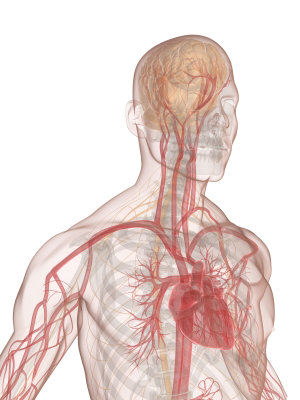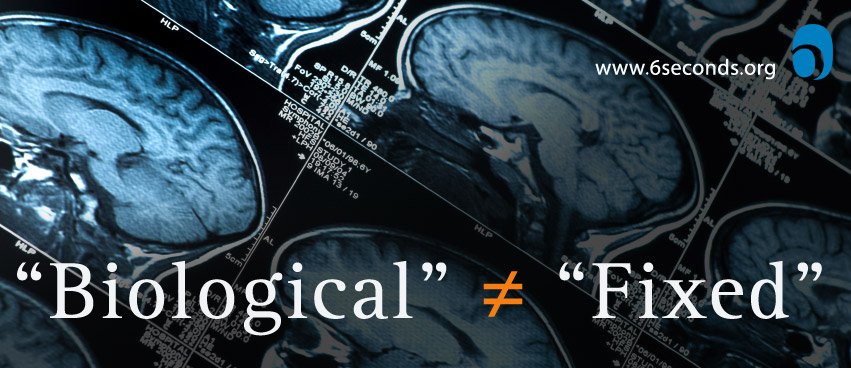I was recently talking to a group about the fact that we can choose how we feel.
“But didn’t you say emotions are an automatic biological response?”
Yes, in fact, I did… but don’t we have choice about our biology? I remember years ago interviewing neurobiologist Debra Niehoff about the way some people seemed to be “programmed” toward violence, and she pointed out that since we’re constantly changing our own brains by the way we use them, it’s a mistake to think of biology as a fixed condition.
We can illustrate this in simple terms:
Yawning is an automatic biological response to being tired. So do we have a choice about if we yawn or not? Isn’t it a choice (for most of us) to sleep more?
Headaches are an automatic biological response to dehydration – but isn’t it a choice (for most of us) to drink enough water?
We are contributing to the creation of the conditions under which our biological systems function — and these have profound impacts on our “automatic” emotional reactions.
Exercising Your Brain
I just read an excellent book excerpt by Jonathan Fields, called The Creative Brain on Exercise on Fast Company. He discusses work by Dr. John Ratey called Spark: The Revolutionary New Science of Exercise and the Brain (2008)…
“Exercise isn’t just about physical health and appearance. It also has a profound effect on your brain chemistry, physiology, and neuroplasticity (the ability of the brain to literally rewire itself). It affects not only your ability to think, create, and solve, but your mood and ability to lean into uncertainty, risk, judgment, and anxiety in a substantial, measurable way…
Ratey details many data points on the connection between exercise and mind-set; among them the following:
- A 2004 study led by Joshua Broman-Fulks of the University of Southern Mississippi that showed students who walked at 50 percent of their maximum heart rates or ran on treadmills at 60 to 90 percent of their maximum heart rates reduced their sensitivity to anxiety, and that though rigorous exercise worked better. “Only the high intensity group felt less afraid of the physical symptoms of anxiety, and the distinction started to show up after just the second exercise session.”
- A 2006 Dutch study of 19,288 twins and their families that demonstrated that those who exercised were “less anxious, less depressed, less neurotic, and also more socially outgoing.”
- A 1999 Finnish study of 3,403 people that revealed that those who exercised two to three times a week “experience significantly less depression, anger, stress, and ‘cynical distrust.'”
Ratey points to a number of proven chemical pathways, along with the brain’s neuroplastic abilities, as the basis for these changes, arguing that exercise changes the expression of fear and anxiety, as well as the way the brain processes them from the inside out.
Studies now prove that aerobic exercise both increases the size of the prefrontal cortex and facilitates interaction between it and the amygdala. This is vitally important to creators because the prefrontal cortex, as we discussed earlier, is the part of the brain that helps tamp down the amygdala’s fear and anxiety signals.”
(And now I’ve quoted an excerpt, quoting a book, quoting another book – welcome to 21st C authorship…)
Eating Your Emotions
 There are also many links between foods and emotions. Just ask Six Seconds’ President, Anabel Jensen, about the emotional effects of eating — and trying not to eat — chocolate. For years its been her “one vice,” a reward that has many positive physiological effects (as well as tasting great). Lately she’s been told to give it up. 😥
There are also many links between foods and emotions. Just ask Six Seconds’ President, Anabel Jensen, about the emotional effects of eating — and trying not to eat — chocolate. For years its been her “one vice,” a reward that has many positive physiological effects (as well as tasting great). Lately she’s been told to give it up. 😥
No doubt, from our those relished dishes of our grandmother, to spices that enchant us to other worlds, foods do more than nourish our corporeal selves. Recently my favorite blogger, Jonah Lehrer, shared an outstanding piece in the Wall Street Journal Online, called The Yogurt Made Me Do It, where he discusses several studies about this — including one on probiotic foods:
The experiment, led by Javier Bravo at University College Cork in Ireland, was straightforward. First, he fed normal lab mice a diet full of probiotics. Then, Mr. Bravo’s team tested for behavioral changes, which were significant: When probiotic-fed animals were put in stressful conditions, such as being dropped into a pool of water, they were less anxious and released less stress hormone.
How did the food induce these changes? The answer involves GABA, a neurotransmitter that reduces the activity of neurons. When Mr. Bravo looked at the brains of the mice, he found that those fed probiotics had more GABA receptors in areas associated with memory and the regulation of emotions. (This change mimics the effects of popular anti-anxiety medications in humans.)
Furthermore, when he severed the nerve connecting the gut and brain in a control group of mice, these neural changes disappeared. The probiotic diet no longer relieved the symptoms of stress.
Though it might seem odd that a cup of yogurt can influence behavior, the phenomenon has been repeatedly confirmed, at least in rodents. Earlier this year, Swedish scientists showed that the presence of gut bacteria shapes the development of the mouse brain, while French researchers found that treating human subjects with large doses of probiotics for 30 days reduced levels of “psychological distress.” There’s nothing metaphorical about “gut feelings,” for what happens in the gut really does influence what we feel.
Choosing How We Feel
So, do we have a choice about our emotions even though they are automatic responses? Perhaps not in all ways, but clearly we can influence the algorithm that shapes the set-points of this automation. We might not be able to turn the instant flash of irritation to delight, but we can set ourselves up so the hot-button produces a larger or smaller jolt.
Now for the confession: As I write this piece, I realize that (a) I have not been sleeping enough since I came back from India this week. I wake up tired in the morning (which is late night there), and so though, while I’ve gone through the motions, (b) I have not really been exercising much this week, and (c) I have not eaten any yogurt! So, if I my kids start arguing and “push my buttons” and I yell at them… will that be an “automatic” biological reaction, or simply a delayed result of my own choices?
- How Emotional Intelligence Coaches Use Emotions in Goal Setting - October 2, 2024
- 3 Winning Strategies for Successful Change Leadership: Coaching with Emotional Intelligence - September 4, 2024
- 3 Emotional Intelligence Tips for the Essence of Coaching - July 31, 2024


Thank you Josh!
Can you please share with us the links for the studies mentioned in the “Exercising your brian” paragraph?
Thank you! 🙂
Hi Ricardo! Michael here from Six Seconds. I added links to the studies above. The first one is to the study itself, and the other two are books that go into the studies in more depth if you’re interested. Thank you for reading!
Stunning read! I might have found my new favorite Blog ha 😀 Please keep it up and thank you for writing. Cheers!
Nice article. People are often unaware of such ‘delayed consequnces of choice’ 😉
I like the way that you relates eating with the emotions. As I am actually trying to eat mindfully… and navigating my emotions and analyzing how relates these two.
I agree that what you eat is what you are, similarly with mood swings on irregular meals. The chinese believes: Never refuse food as it is part of happiness and prosperity (which refers to taste, varieties, the atmosphere who and when dining with, yin and yang of food). My opinion, food becomes healthy or unhealthy, somehow, relates back to how the individual defines food when in a state of emotion whether positive or negative.
Well, this puts a new slant on the old saying “you are what you eat”. I kind of already knew about the exercise thing, and if I had stopped and thought about it I might have recognised the connection between food and mood was maybe a lot closer than we realise.
How do I feel after eating something that isn’t food, like white bread? How do I feel after eating something that is food, like an apple? Such a simple experiment, I’ll go away and have a bit of a play. This is likely to be fun.
I notice that when I eat late (e.g., get busy w work in am, don’t eat ’till lunch) it affect my mood very noticeably. I suspect other affects would be more subtle, but even a minute after you eat the white bread vs apple, I imagine you’d have some different sensations that have an emotional component. Let us know what happens w/ your experiment!
Dear Josh,
thank you once again for these positive, useful and informative articles.
You brighthen up my day 🙂
Jet leg can be difficult to deal with, give yourself some time 🙂
Have a lovely day
Silvia
Thanks Silvia! I’m over jet lag and feeling good — except in 5 days I am back on a plane. Life these days is hectic… I’m not crazy about the hours on the plane and the jetlag, but I’m totally in love with the adventure and deeply grateful for the opportunity to sprinkle these “seeds of EQ” in fertile ground around the world.
So often as I read your articles , I want to send then on to someone else. I don’t find a link where I can email these to others. Is there one?
May you get some sleep!
Love and appreciation for all your work
Linda
Hi Linda – we don’t have a special “function” for that on our blog, but I will check to see if we can add! In the meantime, you can copy the URL from your browser, this one is http://6seconds.org/2011/10/03/exercise-and-emotional-wellbeing/
Thank you for the comment, AND for sharing!
Bad news, though: It’s getting near midnight and I am not sleeping now. 🙁 But I will be very soon! 🙂
Hi Linda:
I wanted to say hello as part of the Six Seconds Network–and its Education Director Global Office.
I also live across the street in Marana, AZ, from someone you know–Claire Raines.
Small world.
Your suggestion is a great one….that’s what social networks are for. Of course, you can share the same post on Facebook, with the FB link, and on Twitter, with that link. But, being able to share by email is important since not everyone participates in the FB/LinkedIn/Twitter world.
Best wishes and hope we get to connect some time ourselves. Let me know if you’d like to Skype. I’m interested in your work and what you are doing now and would love to hear.
Warmly,
Susan